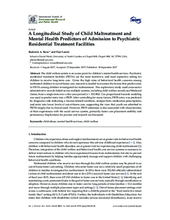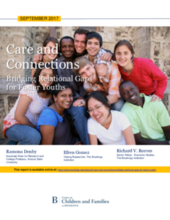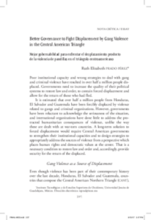This page contains documents and other resources related to children's care in the Americas. Browse resources by region, country, or category.
Displaying 2151 - 2160 of 3116
This exploratory study used cross-sector administrative records linked across multiple systems, including child welfare records and Medicaid claims, from a single state in the U.S. over a five-year period, to investigate the factors that predict entry into psychiatric residential treatment facilities for children.
Claudio Yanez tells his story about growing up without a family in Chile's public care system.
In a recent debate, Jamaica's Education Minister Senator Ruel Reid addressed the number of children living in alternative care in the country: in September 2016, 57 percent of children in care lived in various family-based care settings, while the remaining 43 percent (1,998 children) lived in residential care.
On 18 September 2017, the Sexual Violence Research Initiative will hold its 5th international conference, the SVRI Forum 2017.
The foster care "hackathon" series explores how technology can be optimized to streamline child welfare systems and improve series to young people in care and their families.
This report explores the challenges of implementing and evaluating relationship-based interventions for young people with experience in the U.S. foster care system and presents recommendations for both practitioners and researchers for successful implementation and evaluation in the future.
This essay examines the extreme violence and organized crime in the Central American Northern Triangle (CANT) region that is causing many young people, families, and individuals to flee and become displaced, as well as the widespread forcible gang recruitment in the region.
This study examines whether the use of relative child care improves maternal parenting practices. Data from 3475 families in the Fragile Families and Child Wellbeing Study were used to examine how relative child care is related to parenting behaviors and how the patterns present among each racial/ethnic and immigrant family.
This study utilized data from the Fragile Families and Child Wellbeing Study to examine how kinship care affects maternal stress and parenting practices in racial/ethnic and immigrant families in the United States.
Peru's Congress will debate a proposed law that would install "baby boxes" outside hospitals around the country, which would allow for infants to be abandoned safely and without consequence to the person abandoning the child; critics, however, argue that policy should be addressing the root causes of child abandonment and vulnerability, including family planning, education, and family strengthening programs.




